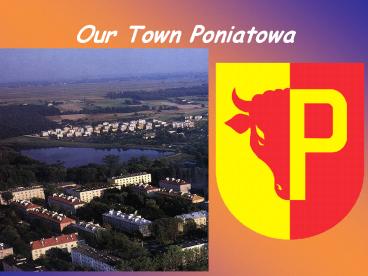Our Town Poniatowa - PowerPoint PPT Presentation
Title:
Our Town Poniatowa
Description:
The name Poniatowa comes from the name of a village which has existed near its ... In its heyday, during the Communist regime, the factory employed about 5000 ... – PowerPoint PPT presentation
Number of Views:42
Avg rating:3.0/5.0
Title: Our Town Poniatowa
1
Our Town Poniatowa
2
Poniatowa is a small town ( about 10 000
inhabitants) in southeastern Poland.
Administratively, it belongs to Lublin Voivodship.
Poniatowa
see city website
3
Some history about the town
- The name Poniatowa comes from the name of a
village which has existed near its site for the
previous 700 years. - The first buildings of the town were put up in
1939, just before the outbreak of World War II
and the German conquest of Poland. - After the war, in 1949, the industrial
development of Poniatowa began again, with a
reconstituted factory EDA established in the
town.
- As a result of the period of intensive growth
after 1952, the town received its city charter in
1962. In its heyday, during the Communist regime,
the factory employed about 5000 workers, about
half of the town's population. It produced
components for refrigerators and other household
appliances. - After the free market reforms in 1989 the factory
experienced economic difficulties, and in 1998
finally entered into bankruptcy. - Presently attempts are being made to attract new
investors to take advantage of the factory's
excellent infrastructure.
4
Natural values
5
- Specific microclimate
- Numerous ponds
- Splendid city park
6
Liceum Ogólnoksztalcace im. Marszalka Józefa
Pilsudskiego (Józef Pilsudski High School)
7
Short History
- In 1948 the first four-form primary school was
established in Poniatowa. At the very beginning
the school was attended only by 40 pupils. - In 1957 primary school turned into general
education school of primary and secondary
levels. Three secondary classes were launched and
they were attended by 74 pupils. In a workers'
hostel, given by the Eda Company, a coeducational
dormitory was organized. - In 1967 primary school moved to another building
in Szkolna Street, so since then there is only
high school in the building in 11 Listopada
Street 5. - In 2007 our high school celebrated its 50th
anniversary. On that occasion it was named after
Polish national hero Józef Pilsudski.
8
Józef Pilsudski our patron
- Józef Klemens Pilsudski (December 5, 1867 May
12, 1935) was an important leader of Poland. - From 1795 to 1918, Poland wasn't independent. It
was parted (in 3 pieces) beetween Russia, Prussia
(Germany) and Austria (Austria-Hungary).
Pilsudski was born in the Russian part. The
government tried to make Poles become Russian but
Pilsudski was born in family of patriots. In 1887
he had troubles, because he helped people who
tried to kill tsar. He was sent to Siberia. - Later Pilsudski was a soldier and wanted to make
Poland independent again.
9
- He came back to Warsaw in November 1918 and
helped to organise Poland. Then, for a short
time, he became its leader (not president).
Poland's situation wasn't good and politicians
argued a lot. The Parliament elected Ignacy
Moscicki to be the new president and he was
Pilsudski's man. Together, they changed the
Polish constitution and made a lot of positive
changes.
10
Our school isnt big but the teachers are great
highly qualified,enthusiastic,motivating as well
as dedicated to their work. They always support
and appreciate students achievements.
11
It is not surprising though that every year the
school collection of 1st place cups and trophies
grows considerably in size.
12
The school offers comprehensive education to
students aged 16-19. They may decide on one out
of three type classes
- class A expanded Maths and Information
Technology - class B expanded Polish and History
- Class C - expanded Biology, Chemistry and
Geography
No matter what type class is chosen, every
student has a chance to learn 2 foreign
languages (English, French, German or Russian)
13
Physical education isnt neglected either.
Students have regular classes in sports hall, on
the sports field, in the gym or in swimming pool.
2 newly modernized computer labs make IT classes
both effective and enjoyable
14
Apart from participating in serious knowledge
contests, a great number of our students take
also active part in school and city cultural
life. They train in Teakwondo club, prepare radio
programmes, do voluntary work, sell in school
shop, etc. Many of them learn to sing and play
instruments in world-known choir Scholares
Minores pro Musica Antiqua (see the website)
15
- Our school is home to many international
initiatives undertaken by students and their
teachers. Among many others it is worth
mentioning - The Week of Culture Project
- Foreign Languages Day
- Eurovision Song Contest
- Peace, Cross-Cultural Understanding Project
(in 2003) with collaboration of AIESEC Poland - since 2008 two lifelong learning Comenius
Projects - 1. Historical Heritage as a Bridge to
Intercultural Understanding - (our partner schools come from Spain,
Italy, Sweden, Turkey, Slovakia) - 2. Intercultural Dialogue Through Music
(our partner schools come from Poland, Italy,
Bulgaria, Germany, Slovenia, England, Cyprus,
Czech Republic)
Our guests from Egypt
16
(No Transcript)































